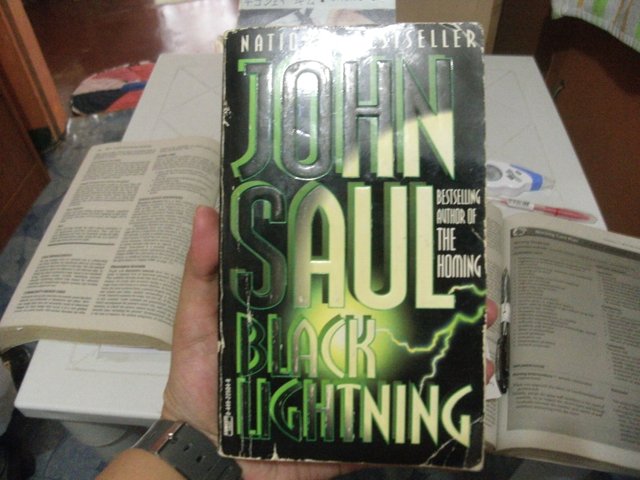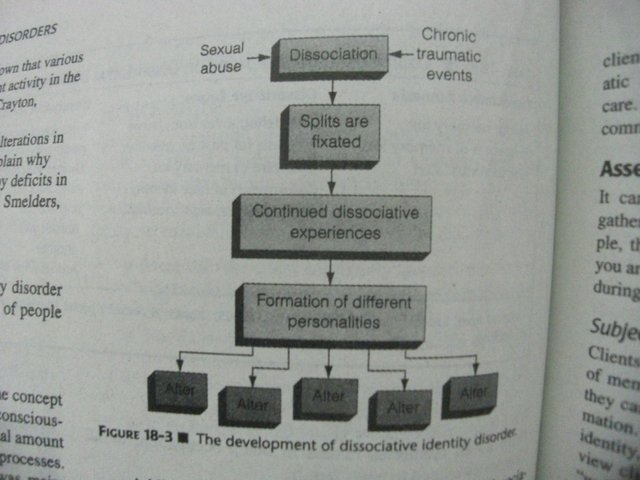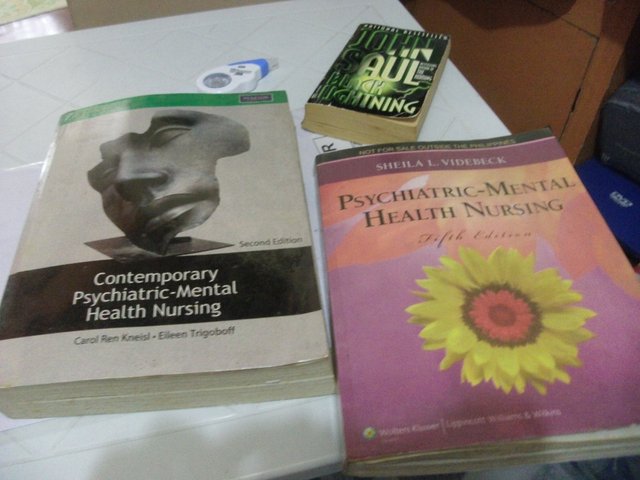Who Is The Real Me? [Shei-sensei Series #13: Mental Health]
Have you ever experienced being dissociated from your real self and creating these other versions of you? Have you ever asked the question, "Who is the real me?". Well, some of us may have asked that question but not to a grave extent. So today, I'll be introducing you to a certain mental health disorder.
Prior to that, I'll explain to you the reason why I decided to share about this topic.
I am currently reading this book and one character who I guess is the murderer is experiencing some mental disorder. Based on the behavior this character is showing in the story, I somehow remembered a certain topic in Psychiatric Nursing which is "Dissociative Disorder".
When I was still a student, I really enjoyed learning this subject so I want to share it to everyone here. Also, I am yet to discover what the character from the book I'm reading is really experiencing, but if I am to diagnose based on his behaviour and symptoms, this will be it.
So, I gathered my books and took down some notes and summarized them into this post. I hope you learn something from this topic.
What is "Dissociative Disorders?"

Image Source
These are conditions in which the client strips an idea, object or situation of its emotional importance and affective content. It often interferes with the person's relationships, function in his or her everyday life as well as the ability to cope with the realities of the abusive or traumatic experience.
One common factor that dissociative disorders have is the defense mechanism called Dissociation".
What is "Dissociation"?
As mentioned above, it's a defense mechanism, a subconscious one, against trauma which separates emotions from behaviors. It helps a person protect his or her emotional self from recognizing the effects of a traumatic experience or event. This defense mechanism allows the mind to forget and remove itself from the situation or memory.
For instance, a person experienced a vehicular accident and the next day he or she tend to forget what happened because it was too traumatic for him or her.
What are these Dissociative Disorders and how are they different?
DISSOCIATIVE AMNESIA
--> client may have one or more episodes of memory loss of important information, however they are often aware that they have a total memory loss for a certain period of time. Their mental status is alert.
In the book I'm currently reading, the character who I think is suffering from Dissociative disorder often have the so-called "blackouts". These blackouts are instances that that character tends to forget. He knows that he did something during that certain time, but he totally forgot what he did that time.
DISSOCIATIVE FUGUE
--> client may wander away from home or any place without any explanation. They tend to forget their identity and may assume a new one. In this case, the client doesn't have any awareness of the loss of memory. Unlike amnesia, the client is aware of the memory loss.
In the book, the character also wanders away from home. And then, when he is in his "normal state", he wonders something about it. One event from the book was, that character (perhaps his alter) went out to buy a fishing rod and a razor. Later that night, he wondered why there's a new razor in the sink and a fishing rod in their basement.
DISSOCIATIVE IDENTITY DISORDER (formerly known as Multiple Personality Disorder)
--> client experiences having more than one distinct personality which recurrently control of his or her own behaviour. They tend to forget some periods of time especially for the alters. There could be an abrupt switch from one alter to another.
The abrupt switch from one alter to another happened in the character from the book I'm currently reading. So far, he has two personalities that are fuzzily mentioned in the book. One of that is the "experimenter" who experiments on humans by dissecting them and the other is a "normal" husband to a reporter wife who is assigned to report on the killings.
DEPERSONALIZATION
--> clients sometimes feel detached from themselves; the usual sense of personal reality is temporarily lost or changed. They're "ego-dystonic" (can't accept their sense of self) and they have intact reality testing.
In intact reality testing, the client detaches his mind from reality and look at that reality as if watching TV. However, this is different from hallucination because the thing that's happening is real.
So far from the book, I haven't noticed this kind of disorder on that character.
Why do these disorders occur?
There are various theories presented which are used to explain these disorders. Let's try to categorize them:
BIOLOGICAL
--> In the development of amnesia, physiological and neurobiological science play a vital role. For instance, Serotonin (a neurotransmitter) affects recall of information. Also in the formation and retrieval of memories, the hypothalamus and the limbic system must function intactly. In case these parts don't function well, the memory of a person will be affected.
GENETIC
--> According to DSM-IV-TR (Diagnostic and Statistical Manual of Mental Disorders-Fourth Edition), first degree biologic relatives of people experiencing the disorder can possibly experience the same.
PSYCHOSOCIAL
Photo taken from my reference book... Check Reference section below...
As you can see in the diagram above, dissociation occurs when an individual experience trauma and abuse. These trauma or abuse may come in physical, psychological or both forms. In order to cope with the traumatic reality, the individual's ego splits. When that individual experiences the trauma or the abuse again and again, there will be a fixation of the dissociative ego splits which will then result to the formation of different personalities or what we call "alter".
To give an example from the book I'm reading, the character who I think is suffering from this disorder had a traumatic childhood experience. There was a flashback in the book which tells the story of his childhood.
Photo taken from the book by John Saul called "Black Lightning".
This part shows his traumatic experience from the hands of his own father when he was a child. There was also a part in the book in which this boy said, "This isn't the first time my father has done this thing to me..." So obviously, it has now become a chronic abuse which lead to the fixation of the character's "dissociated ego splits or alter".
How are these treated?
Group or Individual Therapy
--> to address the long term effects of the condition
Cognitive-Behavioral Therapy
--> deals with the thoughts and subsequent feelings and behaviours of clients. It also focuses on the reassociation and putting consciousness of the clients back together
Medicine
--> they're treated symptomatically. This means that the client will receive medication in accordance with the symptom he or she is experiencing. For example, the client is given anti-anxiety drugs when showing symptoms of anxiousness or panic. Another is "antidepressant" when symptoms of depression shows.
In the end, it's important for the people around these clients to accept that what the clients are experiencing is true. They have to be sensitive enough and be mindful of the client's feelings. Let's help them dwell in the present as comfortably as possible and help them develop the feeling of self-esteem.
I am yet to find out what will happen to the character in the book that I'm reading, but I'll update you with it next time. Thank you so much for reading and I hope you learned something from my post today! Have a nice day!
REFERENCE:
- Black Lightning --> John Saul (for the examples)
- Contemporary Psychiatric-Mental Health Nursing (Kneisl and Trigoboff)
- Psychiatric-Mental Health Nursing (Videbeck)





I wonder if psychedelics would help these symptoms.
Medicines that are given to them are usually based on the symptoms that they're experiencing. However, there's also a notion that giving medication to people with Dissociative disorder is to be with caution. It's in order to not let them re-experience the "traumatic thought" of being controlled. :)
upvote for me please? https://steemit.com/news/@bible.com/6h36cq
upvote for me please? https://steemit.com/news/@bible.com/6h36cq
You got a 2.89% upvote from @upme thanks to @arashikawaii! Send at least 3 SBD or 3 STEEM to get upvote for next round. Delegate STEEM POWER and start earning 100% daily payouts ( no commission ).